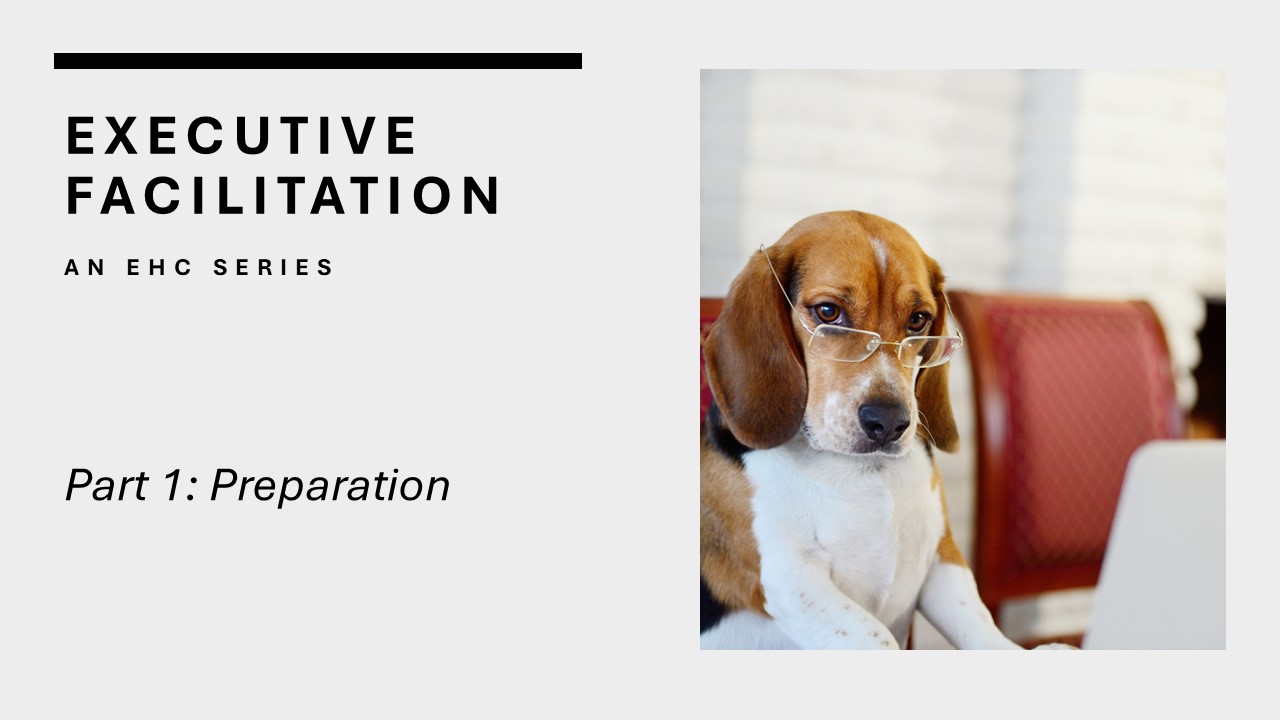
Executive Facilitation
Part 1: Preparation
Executive facilitation is the process of engaging a group of leaders, in real time, to reach the best outcome. Put another way, it helps the right minds create something better than they could individually. The goal of executive facilitation is actionable synergy.
Are you planning executive facilitation? First, answer these questions.
Why are we spending time on this?
Executives are drowning in meetings. Pre-empt “This could have been an email” by testing your plan with a knowledgeable partner, like the sponsor of the effort or the senior executive involved.
Begin with the end in mind. What will you accomplish during the meeting? Are the outcomes input and ideas or decisions and plans? Will you end with a binding consensus on the way forward?
How are you going to get those outcomes? Do you need all that time? Do you need each of the people you’re inviting? Test the outcomes, materials, and facilitation approach ahead of time with the sponsor of the effort.
Your goal: the value of everything you do during the session will be crystal clear to the execs in the room.
Who are the players and what do they want?
Know your participants. Know the basics: their names, roles, titles, functions, and time with the company.
Then dig a little deeper. Understand their styles and motivations. Are they likely to speak up or not? Will they happily collaborate and hear others out? Do they have any particular motivations or affiliations that will affect the group’s work?
Ask the sponsor: If this meeting goes sideways, how will that happen? What are the potential road bumps? How should we get ahead of them?
All that intel will help you manage the group toward the outcomes they need. You might need to:
- Draw some participants out to make sure their ideas are in the mix.
- Help those with a minority opinion “hold space” during the discussion.
- Form breakout groups or pick discussion leaders to avoid trouble.
- Present or “plant” information to balance out someone with an agenda or maintain momentum.
What’s the scoop?
It’s important to ground yourself with information, especially if you’re an “outside” facilitator. Sometimes participants make assumptions that aren’t right. This can set the whole group in the wrong direction.
Another problem: you might not have all the information represented in the room. For example, maybe no one in the room represents “the work.” Often, non-executives have the best understanding of the implications of the decisions made in the room. But they’re not there. You, the facilitator, might have to bring that information to the session.
Do a little research.
Talk to the sponsor or trusted experts to make sure the assumptions and data underpinning your outcomes are sound. In other words, make sure the group is having the right conversation.
How should participants prepare?
Participants need the why, when, where, who, and what.
- WHY — Give participants the vision: the outcomes of the session and what those outcomes will do for them and for the organization.
- WHEN and WHERE — Set clear expectations on time and place. Will you start on time? Will there be a buffer, like breakfast or lunch, before you start? Will you offer breaks? When should they expect to finish? Is it ok to join virtually or not?
- WHO — Let everyone know who else will come and what their work role is or whom they’re representing.
- WHAT — Give them a sense of how the day will go. Are there any big topics, activities, or ground rules? What decisions will be made? There’s a big difference between “We will discuss…” and “We will decide…” Let them know the stakes.
And tell them what to prepare or bring to the session. For example, do you need some participants to be ready to report on their areas of expertise? What form should it take? (Slides? Handouts? Written data on a whiteboard?) And make sure the sponsor or senior exec is ready to set up the purpose and expected outcomes of the session; if you’re an external facilitator, you should not do that.
Well begun is half done. Isn’t that what they say? It’s never more true than in executive facilitation. Set yourself up for success by doing the right prep work




